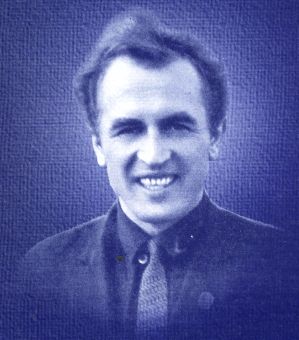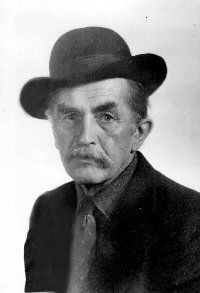Poet. Political prisoner (1972-75, 1979-82). Laureate of the V. Sosiura Prize (1990) and the T. Shevchenko National Prize (1992).
He was born to a Hutsul mother, Hanna Ivanivna, and Yuriy Stepanovych Melnychuk, a village craftsman with golden hands: he was a blacksmith, a wheelwright, and a weaver. The family was religious. His childhood was difficult: war, trenches, Germans, Muscovites, Hungarians…
After completing seven-year school, he continued his education at Yabluniv Secondary School, from which he graduated in 1955. He passed the exams for the journalism department of Lviv State University but was not admitted. He returned home and married his beautiful beloved, Maria Zalutska. Their civil registration was at the end of May; they were married in church in July. But before the wedding, Taras had managed to travel to work in logging in the Komi Republic and in the mines of the Donbas region. The poet understood that without life experience, he would not amount to anything worthwhile in literature. And he would not be admitted to study without work experience.
In the autumn of 1957, the 19-year-old youth said goodbye to his pregnant wife. He was conscripted for military service and sent to the Primorsky Krai. When Nikita Khrushchev initiated a major reduction of the Armed Forces, the sick and married were discharged early. Thus, Taras served only 8 months. His wife Maria gave birth to a daughter, Yaroslava.
In 1958, he enrolled in the philology department of Chernivtsi University. For two years, he was elected group leader. He wrote a lot, but not “like everyone else.” He had an innovative talent. He could write 15-20 poems in one night. He never revised them, so they were not always polished. He could not physically manage to write them all down: the poems came to him from the Heavens, from the Moon, which he loved dearly. He did not care much about preserving them. More were lost than saved.
He was twice expelled from Chernivtsi University (1968-72), completing 3 years of study. He studied by correspondence at the Maxim Gorky Literature Institute in Moscow.
On a Komsomol assignment, he went to Kryvyi Rih to help build a mining and processing plant, where he asphalted streets and roads. He worked in a geodetic party in Tomsk Oblast, as a carpenter in Krasnoyarsk, and as a hammer operator, loader, and locksmith on the Odesa railway. His rebellious fate (Taras means “rebel” in Greek) did not allow him to stay in one place for long.
He returned to Ukraine in 1964. He worked for several raion newspapers (Khotyn, Hlyboka, Kosiv, Bohorodchany, Verkhovyna). In the spring of 1964, he debuted with a selection of poems in the journal “Dnipro.” He began to be invited to literary studios. His collection *Nesimo liubov planeti* (“Let’s Bring Love to the Planet”) was published in 1967.
His second wife, Tetyana, with whom he had a common-law marriage, gave birth to a son, Vitaliy, but they also separated.
On January 24, 1972, Taras Melnychuk was arrested for the manuscript of a book of poetry titled “Chaha” (Tinder Fungus). Kyiv censors found a dozen poems in it that were interpreted as anti-Soviet. His home in Utoropy was searched, and his entire literary archive was confiscated. He was charged with “anti-Soviet agitation and propaganda,” although the poems did not mention the Soviet government at all. They were an expression of pain for Ukraine. He was sentenced in Ivano-Frankivsk on May 11, 1972, to 3 years in strict-regime camps under Article 62, Part 1 of the Criminal Code of the UkrSSR. He was sent to the 36th camp in Perm Oblast. He actively participated in the protest actions of political prisoners. M. authored a complaint to the Prosecutor of the Russian Federation regarding the inhumane treatment of political prisoners by the guards. He gave his written poems to friends but seemed unconcerned about their fate. That became the responsibility of his friends, particularly M. HORBAL and L. LUKYANENKO. However, not all of them made it out. He had to destroy a handwritten collection on cigarette paper himself. In the zone, he kept to himself, somewhat detached and forlorn. But on October 12, 1974, he began a hunger strike to protest the camp doctor’s refusal to provide necessary medical care to fellow political prisoner I. SVITLYCHNY.
M. was released in January 1975. He returned to his home village. For refusing to condemn his past, he was denied a residence permit and the opportunity to work. He traveled to Novosibirsk for work. In the summer of 1976, he returned home.
He was arrested for a second time in January 1979. He was punched in the teeth, and he knocked a knife out of a hooligan’s hand. The knife was attributed to him. He was charged under Article 206, Part 3 of the Criminal Code of the UkrSSR, “malicious hooliganism.” For about two months, M. hid at the home of D. HRYNKIV in Kolomyia and V. SHOVKOVY in Pechenizhyn. But the poet did not hide very carefully and appeared in public. He was tracked down and arrested. He was sentenced in April 1979 in Kosiv to 4 years of imprisonment. He was sent to a common criminal zone, IV-301/86, in Vinnytsia. Only one pickpocket knew that Taras wrote poems, and he skillfully hid them. His ex-wife visited him and smuggled the poems out. He was visited in the zone by poets Nina Hnatiuk and Dmytro Pavlychko (who had once attended the same school with him). During his hard times, Taras hid behind pseudonyms: Oleh Chornoboh, Stanislav Halych, Zinoviy Kailos, Myroslav Kokil, Svitozar Boyshak.
In 1982, M. was released. That same year, he was forcibly committed to a psychiatric hospital in the village of Dzhuriv, Kosiv Raion. He was treated for alcoholism. This was torture with large doses of medication intended to destroy the poet. In 1985, his friends (D. HRYNKIV) decided to kidnap him. But he escaped on his own two hours before the planned abduction and was waiting for them outside the village. He hid in Kolomyia and Snyatyn. But a month later, he reappeared in public. He was caught and committed to the Pidmykhailivtsi-Ivano-Frankivsk Centralized Psychiatric Hospital. He was released only after the Chornobyl disaster.
In 1982, a small collection of 28 poems written in prison, *Iz-za grat* (“From Behind Bars”), was published in Toronto by the V. Symonenko “Smoloskyp” publishing house without the author's knowledge or consent. In 1990, a book of M.’s poetry, *Strofy z Holhofy* (“Strophes from Golgotha”), was published in Great Britain. In his poems, the poet developed his own interpretation of the ancient roots of the Ukrainian people, their historical existence, and spiritual cosmos. M. looked to no one—only to his Ukraine, to which he was chained by his word. His undeniable, innovative talent was rare; it absorbed the free spirit of the Carpathian mountains and the vastness of the eastern Ukrainian steppes. “The real Taras Melnychuk is in his poetry. Let us seek him there” (M. Zhulynsky). The collection *Kniaz rosy* (“The Prince of Dew”) appeared only in 1990. He was immediately admitted to the Union of Writers of Ukraine.
In 1990, on his birthday, some miscreants burned down his mother’s house, where suitcases full of poems and books were stored. He had spent that night at a friend's house.
One day, officers of the Security Service of Ukraine made a fine gesture: they took the manuscript of the poetry collection “Chaha” from the archive and handed it to the author. He received a pre-press copy a few days before his death.
In 1991, M. was awarded the V. Sosiura Literary Prize for his book *Kniaz rosy*. The T. Shevchenko National Prize was awarded to him in 1992.
He lived his final years in Kolomyia. He is buried where their house once stood in Utoropy.
Bibliography
1.
Let’s Bring Love to the Planet: Poems. Uzhhorod: Karpaty, 1967, 42 pp.;
From Behind Bars: Poems. Foreword by O. Zinkevych. Baltimore–Toronto: Smoloskyp, 1982, 83 pp.;
“Prison Poems.” Kafedra, 1989, no. 8, pp. 69–77;
The Prince of Dew: Verses. Foreword by M. Zhulynsky. Kyiv: Molod, 1990, 152 pp.;
Chaha: Poems. Foreword by Ya. Doroshenko. Kryvyi Rih: Vik, Prosvita, 1994, 175 pp.;
A Palace in a Dewdrop: Long Poems, Ballad. Chernivtsi: Molodyi bukovynets, 2004, 80 pp.;
Wintergreen. Compiled by V. Shkurhan, H. Kuryshchuk, M. Popadiuk, foreword by V. Shkurhan, A. Hryhoruk. Kosiv: Pysanyi Kamin, 2006, 264 pp.;
Works in three volumes. Vol. I: Poems. Compiled by M. Andrusiak, S. Pushyk, foreword by S. Pushyk. Kolomyia: Vik, 2003, 258 pp.; Vol. II: Poems. Compiled by M. Andrusiak, M. Lazarchuk, 2003, 256 pp.; Vol. III, Book 1: Poems. Compiled by Ye. Baran, 2006, 496 pp.; Vol. III, Book 2. Compiled by Ye. Baran, 2007, 344 pp.
2.
Hnatiuk, Nina. “Taras Melnychuk: A Song from Behind Bars.” Slovo, 1994, no. 6 (86).
“The Flight of a Prisoner: A Conversation (by V. Shkliar) with the Ukrainian poet T. Melnychuk about the repressions he suffered in the 60s-70s.” Molod Ukrainy, July 18, 1995; also in Samostiina Ukraina, 1995, no. 19 (166), May 24–31.
Hnatiuk, N. “T. Melnychuk: ‘I Have Nothing Left but My Honor’: For the 60th anniversary of the poet.” Den, no. 158, August 20, 1998;
Hrynkiv, D. Interview from February 8, 2000. Kharkiv Human Rights Protection Group Archive: 1121879635.
Pushyk, S. “The Poet's Fate: Letters of T. Melnychuk.” Berezil, 2003, no. 1/2, pp. 66-106;
Hnatiuk, N. “The Molfar’s Floyara.” Slovo Prosvity, no. 32, August 13–19, 2009.
Lukyanenko, L. From the Times of Captivity. Book Four: The Land of Moxel. Kyiv: Feniks, 2010, pp. 79–80, 152–163.
The Resistance Movement in Ukraine: 1960–1990. An Encyclopedic Guide. Foreword by Osyp Zinkevych and Oles Obertas. Kyiv: Smoloskyp, 2010, pp. 427-428.
Iryna Prysiazhniuk. “Taras Melnychuk.” Kosivshchyna Portal. http://kosiv.info/kosivschina/47-famous-kosiv/648-taras-melychuk.html

MELNYCHUK TARAS YURIYOVYCH

MELNYCHUK TARAS YURIYOVYCH